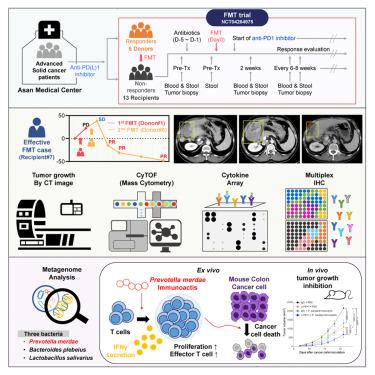当前位置:
X-MOL 学术
›
Cell Host Microbe
›
论文详情
Our official English website, www.x-mol.net, welcomes your
feedback! (Note: you will need to create a separate account there.)
Fecal microbiota transplantation improves anti-PD-1 inhibitor efficacy in unresectable or metastatic solid cancers refractory to anti-PD-1 inhibitor
Cell Host & Microbe ( IF 20.6 ) Pub Date : 2024-07-25 , DOI: 10.1016/j.chom.2024.06.010 Yunjae Kim 1 , Gihyeon Kim 2 , Sujeong Kim 1 , Beomki Cho 1 , Sang-Yeob Kim 3 , Eun-Ju Do 3 , Dong-Jun Bae 4 , Seungil Kim 5 , Mi-Na Kweon 5 , Joon Seon Song 6 , Sang Hyoung Park 7 , Sung Wook Hwang 7 , Mi-Na Kim 8 , Yeongmin Kim 1 , Kyungchan Min 1 , Sung-Han Kim 9 , Mark D Adams 10 , Charles Lee 10 , Hansoo Park 2 , Sook Ryun Park 11
Cell Host & Microbe ( IF 20.6 ) Pub Date : 2024-07-25 , DOI: 10.1016/j.chom.2024.06.010 Yunjae Kim 1 , Gihyeon Kim 2 , Sujeong Kim 1 , Beomki Cho 1 , Sang-Yeob Kim 3 , Eun-Ju Do 3 , Dong-Jun Bae 4 , Seungil Kim 5 , Mi-Na Kweon 5 , Joon Seon Song 6 , Sang Hyoung Park 7 , Sung Wook Hwang 7 , Mi-Na Kim 8 , Yeongmin Kim 1 , Kyungchan Min 1 , Sung-Han Kim 9 , Mark D Adams 10 , Charles Lee 10 , Hansoo Park 2 , Sook Ryun Park 11
Affiliation

|
The gut microbiome significantly influences immune responses and the efficacy of immune checkpoint inhibitors. We conducted a clinical trial (NCT04264975) combining an anti-programmed death-1 (PD-1) inhibitor with fecal microbiota transplantation (FMT) from anti-PD-1 responder in 13 patients with anti-PD-1-refractory advanced solid cancers. FMT induced sustained microbiota changes and clinical benefits in 6 of 13 patients, with 1 partial response and 5 stable diseases, achieving an objective response rate of 7.7% and a disease control rate of 46.2%. The clinical response correlates with increased cytotoxic T cells and immune cytokines in blood and tumors. We isolated Immunoactis from a responder to FMT, which stimulates T cell activity and suppresses tumor growth in mice by enhancing cytotoxic T cell infiltration. Additionally, we found and may inhibit anti-tumor immunity. Our findings suggest that FMT with beneficial microbiota can overcome resistance to anti-PD-1 inhibitors in advanced solid cancers, especially gastrointestinal cancers.
中文翻译:

粪便微生物群移植可提高抗 PD-1 抑制剂对抗 PD-1 抑制剂难治性不可切除或转移性实体癌的疗效
肠道微生物组显着影响免疫反应和免疫检查点抑制剂的疗效。我们在 13 例抗 PD-1 难治性晚期实体癌患者中进行了一项临床试验 (NCT04264975) 将抗程序性死亡 1 (PD-1) 抑制剂与抗 PD-1 反应者的粪便微生物群移植 (FMT) 相结合。FMT 诱导 13 例患者中 6 例持续微生物群变化和临床获益,1 例部分缓解,5 例疾病稳定,客观缓解率为 7.7%,疾病控制率为 46.2%。临床反应与血液和肿瘤中细胞毒性 T 细胞和免疫细胞因子的增加相关。我们从 FMT 反应者中分离出 Immunoactis,FMT 通过增强细胞毒性 T 细胞浸润来刺激 T 细胞活性并抑制小鼠的肿瘤生长。此外,我们发现并可能抑制抗肿瘤免疫。我们的研究结果表明,具有有益微生物群的 FMT 可以克服晚期实体癌(尤其是胃肠道癌症)对抗 PD-1 抑制剂的耐药性。
更新日期:2024-07-25
中文翻译:

粪便微生物群移植可提高抗 PD-1 抑制剂对抗 PD-1 抑制剂难治性不可切除或转移性实体癌的疗效
肠道微生物组显着影响免疫反应和免疫检查点抑制剂的疗效。我们在 13 例抗 PD-1 难治性晚期实体癌患者中进行了一项临床试验 (NCT04264975) 将抗程序性死亡 1 (PD-1) 抑制剂与抗 PD-1 反应者的粪便微生物群移植 (FMT) 相结合。FMT 诱导 13 例患者中 6 例持续微生物群变化和临床获益,1 例部分缓解,5 例疾病稳定,客观缓解率为 7.7%,疾病控制率为 46.2%。临床反应与血液和肿瘤中细胞毒性 T 细胞和免疫细胞因子的增加相关。我们从 FMT 反应者中分离出 Immunoactis,FMT 通过增强细胞毒性 T 细胞浸润来刺激 T 细胞活性并抑制小鼠的肿瘤生长。此外,我们发现并可能抑制抗肿瘤免疫。我们的研究结果表明,具有有益微生物群的 FMT 可以克服晚期实体癌(尤其是胃肠道癌症)对抗 PD-1 抑制剂的耐药性。































 京公网安备 11010802027423号
京公网安备 11010802027423号